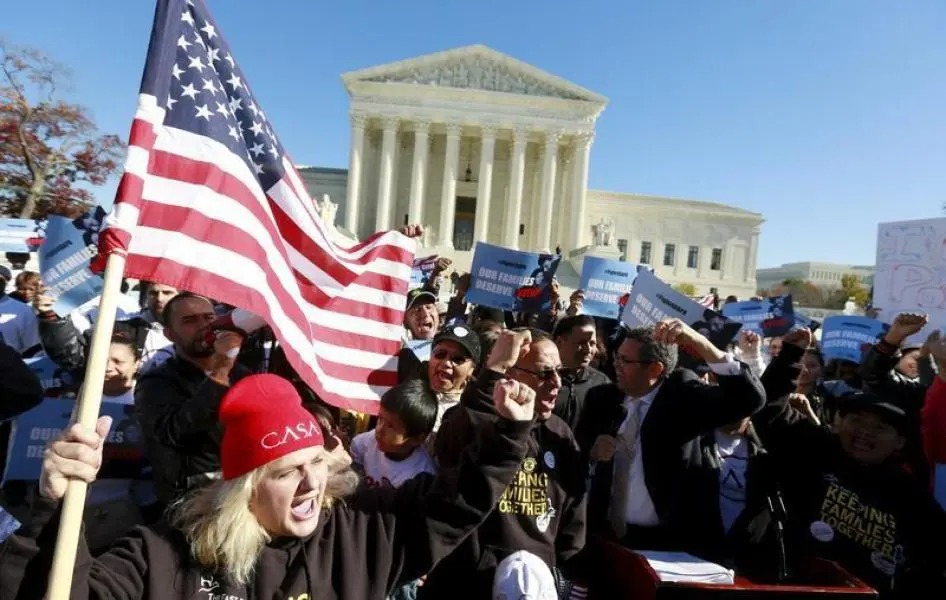News Desk: Confusion and fear swept through immigrant communities across the United States on Friday after a Supreme Court ruling introduced new uncertainty over the future of birthright citizenship. While the decision did not overturn the constitutional guarantee that those born on U.S. soil are citizens, it opened the door to a controversial Trump administration policy aimed at restricting that right.
The court’s conservative majority upheld President Donald Trump’s power to implement immigration policies with less judicial interference, allowing his executive order on birthright citizenship to potentially take effect in 30 days. However, the justices stopped short of ruling on whether the policy itself is constitutional—leaving families and legal experts grappling with what comes next.
Widespread Uncertainty Among Immigrants
For many, the ruling has triggered more questions than answers.
“I don’t understand it well,” said Lorena, a 24-year-old Colombian asylum seeker in Houston who is due to give birth in September. She’s worried her baby might end up stateless. “I don’t know if I can give her my nationality. I don’t want her to be adrift with no nationality.”
Trump’s executive order, issued in January, states that only children born to at least one U.S. citizen or legal permanent resident will be recognized as American citizens. While it was quickly blocked by multiple lower courts, Friday’s decision weakens those barriers—potentially creating a fractured legal landscape across the country.
Patchwork of Rights
If left unchallenged, the policy could take effect in 28 states that did not join legal efforts to block it, raising fears of a “confusing patchwork” of citizenship rules, said Kathleen Bush-Joseph of the Migration Policy Institute.
“Would individual hospitals now be tasked with determining the legal status of every baby’s parents?” she asked.
That uncertainty is already being felt on the ground. Immigration lawyers and advocacy groups report a surge in calls from anxious clients, unsure whether their future children will be recognized as U.S. citizens.
Legal Fallout and New Lawsuits
On Friday afternoon, civil rights groups filed an amended lawsuit in Maryland seeking to establish a nationwide class of potentially affected families. Some legal protections remain in place—members of plaintiff organizations such as CASA and the Asylum Seeker Advocacy Project are still shielded under existing court orders—but the practicalities of who qualifies, and how, are murky.
“If someone in a non-plaintiff state joins CASA, are they protected? How do officials even check?” asked Lynn Tramonte, director of the Ohio Immigrant Alliance.
One CASA member, Betsy, a recent high school graduate from Virginia, was born to undocumented parents from El Salvador. “This targets innocent kids who haven’t even been born yet,” she said.
A Broader Immigration Crackdown
Trump, who has long framed birthright citizenship as a “magnet” for undocumented migration, reinforced that message Friday, claiming that “hundreds of thousands of people are pouring into our country under birthright citizenship.”
His efforts form part of a broader agenda to reduce legal and illegal immigration, a cornerstone of his administration and reelection campaign.
Anxious Future for Families
In Louisiana, Nivida, a Honduran asylum seeker and member of the Asylum Seeker Advocacy Project, said she received a panicked call from a friend—an undocumented pregnant woman—worried about what her baby’s legal status would be if born in the state.
“She asked me, ‘If I give birth here, is my baby still a citizen?’ I couldn’t answer her,” Nivida said.
Humanitarian Concerns Mount
Immigration advocates say the policy could result in up to 150,000 children born each year being denied automatic citizenship, creating what many fear would be a generation of stateless children within U.S. borders.
“This creates unequal classes of people with different rights based solely on the circumstances of their birth,” said Juliana Macedo do Nascimento of United We Dream. “That is really chaotic.”
As legal battles continue and the 30-day implementation clock ticks down, immigrant families across the country are left holding their breath—awaiting clarity on a decision that could shape their children’s futures forever.





